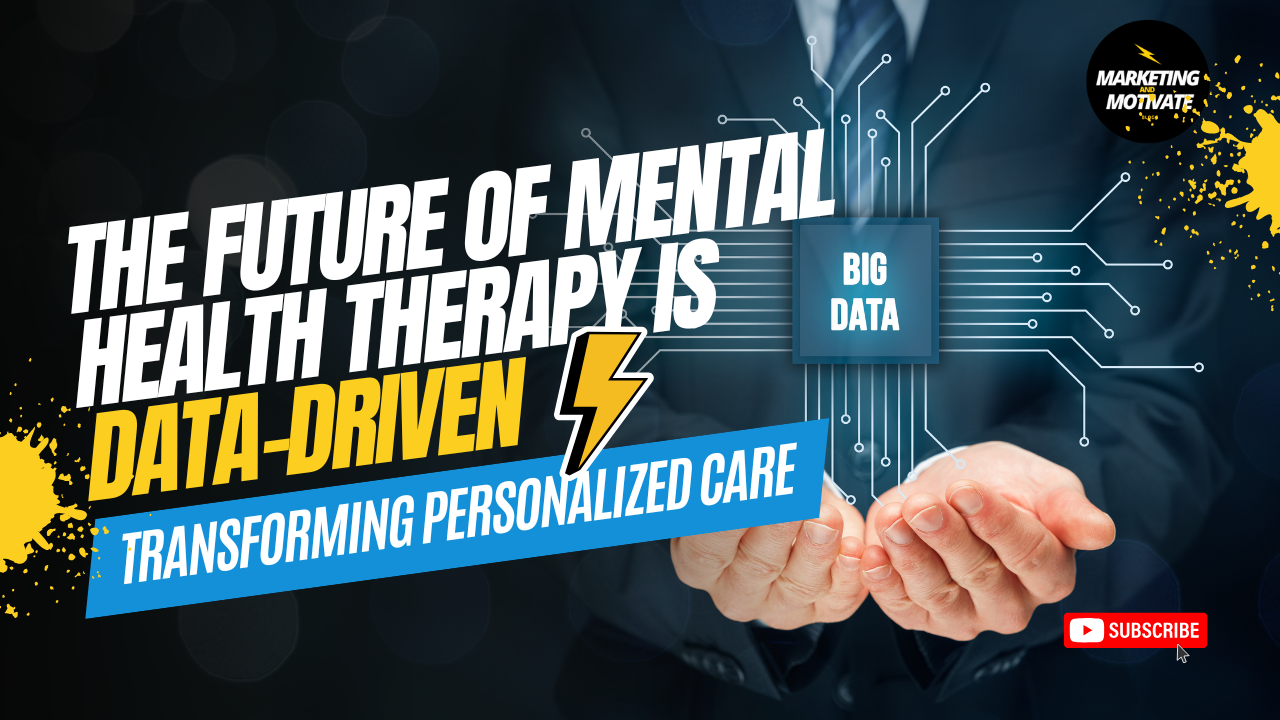The Future of Mental Health Therapy is Data-Driven: How Big Data is Transforming Personalized Care and Positioning Private Practices as Innovative Leaders

Mental health therapy is undergoing a significant transformation, and at the heart of this change is the rise of data-driven approaches. Big data, once the domain of tech giants and corporations, is now reshaping the landscape of mental health care, enabling therapists to offer more personalized treatment, improve client outcomes, and position private practices as pioneers in their field.
By leveraging data insights, therapists can provide more effective care, streamline their operations, and build stronger client relationships. In this article, we’ll explore how big data is redefining mental health therapy and what it means for the future of private practices.
The Rise of Data-Driven Mental Health Therapy
What is Data-Driven Therapy?
Data-driven therapy refers to the use of collected data to inform treatment strategies. This data can come from various sources, including client history, behavioral metrics, wearable devices, and digital tools. By analyzing this information, therapists can:
- Identify patterns in client behavior and symptoms.
- Tailor treatment plans to individual needs.
- Track progress and make data-backed decisions about care.
The Impact of Big Data on Healthcare
Big data has already revolutionized fields like medicine and public health. For example, predictive analytics is used to forecast disease outbreaks or personalize cancer treatments. In mental health, big data is now making it possible to:
- Predict client outcomes based on historical data.
- Develop interventions that are evidence-based and client-specific.
- Improve access to care through digital platforms and real-time tracking.
How Big Data Enhances Personalized Mental Health Care
Tailoring Treatment Plans Based on Data Insights
One of the most significant benefits of data-driven therapy is the ability to create highly personalized treatment plans. By leveraging data, therapists can:
- Identify which therapeutic approaches are most effective for a client’s specific condition.
- Adjust session content and frequency based on measurable progress.
- Use predictive models to determine the likelihood of success with a particular intervention.
Tracking Client Progress and Adjusting Approaches
Data-driven tools allow therapists to monitor client progress in real-time. For example:
- Symptom tracking apps enable clients to log daily moods, stress levels, or sleep patterns.
- Wearable devices provide insights into physiological markers like heart rate variability or physical activity.
- These data points can guide therapists in modifying treatment plans to ensure optimal outcomes.
Identifying Early Warning Signs of Mental Health Challenges
Big data can also help identify potential issues before they escalate. For example:
- Behavioral patterns, such as decreased activity or irregular sleep, may signal worsening depression.
- Data trends can alert therapists to potential relapses, enabling proactive interventions.
The Role of Technology in Data-Driven Therapy
Wearable Technology and Apps for Mental Health Monitoring
Wearable devices and mental health apps are becoming essential tools in therapy. They provide real-time data that therapists can use to understand a client’s mental state. Key benefits include:
- Tracking physical health metrics that correlate with mental well-being, such as sleep quality or heart rate.
- Offering clients reminders and exercises to maintain therapy engagement between sessions.
Examples:
- Fitness trackers that monitor stress through heart rate variability.
- Apps like Moodpath/MindDoc or Woebot that help clients track emotions and practice mindfulness.
Integration with Electronic Health Records (EHR) Systems
EHR systems are enhancing the efficiency of data collection and analysis in therapy practices. These systems allow therapists to:
- Consolidate client information in one place, including session notes, progress reports, and external data from apps or wearables.
- Use dashboards to quickly assess a client’s progress and identify areas for intervention.
Artificial Intelligence (AI) and Machine Learning in Therapy
AI and machine learning are revolutionizing the analysis of therapy-related data. These technologies can:
- Analyze large datasets to identify trends and predict treatment outcomes.
- Provide therapists with recommendations for interventions based on historical data.
- Automate administrative tasks, freeing up more time for direct client care.
Data-Driven Therapy Improves Client Outcomes
Evidence-Based Decision Making for Better Results
Therapists using data-driven approaches can make decisions rooted in evidence rather than intuition. This leads to:
- Increased effectiveness of treatment plans.
- Greater consistency in achieving positive client outcomes.
Example: A therapist working with an anxiety client can use data from past clients to determine that CBT is likely the most effective approach and monitor progress to confirm its efficacy.
Enhanced Client Engagement and Satisfaction
Data-driven therapy often involves clients directly in their treatment process. Benefits include:
- Clients can see measurable progress through data visualizations, reinforcing their commitment to therapy.
- Personalized care fosters a stronger therapeutic alliance, leading to higher satisfaction and retention.
Reduced Risk of Burnout and Over-Treatment
By using data to optimize care, therapists can:
- Avoid over-treating clients who no longer need intensive therapy.
- Prevent burnout by managing caseloads more effectively and focusing on high-impact interventions.
Big Data Positions Private Practices as Innovative Leaders
Staying Ahead of Competitors with Data-Driven Practices
Therapists who adopt data-driven tools are seen as forward-thinking and innovative. This provides:
- A competitive edge in a growing mental health market.
- Increased trust from clients who value modern, evidence-based approaches.
Improving Operational Efficiency and Reducing Costs
Data doesn’t just enhance client care—it also improves business operations. Practices can:
- Use analytics to identify inefficiencies in scheduling, billing, or client acquisition.
- Allocate resources more effectively, reducing operational costs.
Marketing Your Data-Driven Approach
Highlighting a data-driven approach in your marketing can attract tech-savvy clients. Strategies include:
- Showcasing your use of technology and data in blog posts, social media, and website copy.
- Sharing success stories (with consent) that illustrate how data-driven insights improved client outcomes.
Ethical Considerations and Challenges of Data-Driven Therapy
Maintaining Client Privacy and Confidentiality
As with any use of data, maintaining privacy is critical. Therapists should:
- Use secure, HIPAA-compliant platforms for storing and sharing client data.
- Communicate clearly with clients about how their data is collected, used, and protected.
Balancing Data with the Human Element of Therapy
While data is a powerful tool, therapy remains a deeply personal process. Therapists should:
- Use data as a supplement to, not a replacement for, empathetic, client-centered care.
- Ensure that clients feel heard and understood beyond what the data shows.
Overcoming Resistance to Data-Driven Practices
Adopting new technology can be intimidating. To ease the transition:
- Start small by integrating one data-driven tool, such as a symptom tracking app.
- Invest in professional development to learn how to interpret and use data effectively.
- Educate clients on the benefits of a data-driven approach to build trust and buy-in.
Embracing the Future of Data-Driven Therapy
Big data is not just a trend, it’s the future of mental health therapy. By integrating data-driven tools and insights, therapists can deliver more personalized care, achieve better client outcomes, and position their practices as leaders in the field.
For private practices, embracing data-driven approaches means staying ahead of the curve and providing clients with the innovative, evidence-based care they deserve. Start small, invest in the right tools, and take the first steps toward making data a central part of your practice.
Ready to explore data-driven therapy? Begin by identifying tools that align with your practice goals and see how technology can elevate the care you provide.
Ready to grow?
Ready to take your career or private practice to the next level?
We are currently building the #1 Community for Therapists. With our recent launch, our goal is to have at least 1000 ambitious like-minded therapists in "Therapreneur" by the end of 2025.
Click the link here to find out Why Every Therapist Needs a Community 👈


